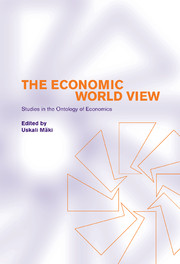Preface
Published online by Cambridge University Press: 04 August 2010
Summary
What is the world made of? How does the world work? Is it governed by causes? What is the nature of causality? Are some states of the world necessary and some others impossible? Do universals exist? Do minds exist? Do human beings have a free will? Are there social wholes irreducible to their parts? These are examples of questions that philosophers and scientists keep asking and answering, and have kept asking and answering for centuries. They are concerned with the most fundamental components in our general world views. Some of the time, these questions and answers have been explicit, while much of the time they are implicit. Such questions and answers, at various levels of specificity, are ever-present also in economics: they are presupposed and they are implied in the acts of economic reasoning, both theoretical and empirical. The purpose of this book is to help start making them explicit. To make such elements of economic reasoning explicit is to examine the ontology of economics. It is to study the basic world views of economics.
The economic world view suggests an intellectual challenge from two perspectives. It tends to be part of our everyday experience that economic considerations (those related to money and the market, cost and benefit calculations, etc.) have been growing in importance in our social lives. The academic world has also been witnessing, not only the growing importance of economic constraints on academic life, but also the growing importance of economics as a discipline, both as a resource for studying social phenomena and as a target of study itself.
- Type
- Chapter
- Information
- The Economic World ViewStudies in the Ontology of Economics, pp. xv - xviPublisher: Cambridge University PressPrint publication year: 2001
- 1
- Cited by

